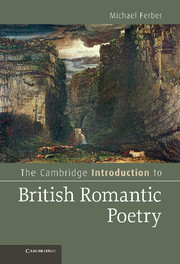Book contents
- Frontmatter
- Contents
- Preface
- Acknowledgments
- Chapter 1 Introduction
- Chapter 2 The poet
- Chapter 3 “Tintern Abbey”
- Chapter 4 Romantic odes
- Chapter 5 The French Revolution
- Chapter 6 Romantic sonnets
- Chapter 7 Romantic love lyrics
- Chapter 8 Romantic ballads
- Chapter 9 Romantic epics and romances
- Chapter 10 Romantic verse drama
- Chapter 11 Romantic satire
- Appendix
- Notes
- Further reading
- Index
Chapter 9 - Romantic epics and romances
Published online by Cambridge University Press: 05 June 2012
- Frontmatter
- Contents
- Preface
- Acknowledgments
- Chapter 1 Introduction
- Chapter 2 The poet
- Chapter 3 “Tintern Abbey”
- Chapter 4 Romantic odes
- Chapter 5 The French Revolution
- Chapter 6 Romantic sonnets
- Chapter 7 Romantic love lyrics
- Chapter 8 Romantic ballads
- Chapter 9 Romantic epics and romances
- Chapter 10 Romantic verse drama
- Chapter 11 Romantic satire
- Appendix
- Notes
- Further reading
- Index
Summary
“Milton! thou should’st be living at this hour,” Wordsworth writes in a sonnet (“London 1802”), “England hath need of thee.” She has become stagnant, selfish, and unhappy, and Milton’s spirit would raise her up again. His soul was like a star, his voice was like the sea’s – pure, majestic, and free.
Milton wrote poems of every sort, including sonnets of the sort Wordsworth is writing here, as well as a great deal of prose, but he was best known, and most revered, for his epic Paradise Lost, that sea of majestic blank verse. Since the time of the ancients the prevalent opinion was that the epic is the highest genre, and to compose one is the highest ambition of poets, though there were a few who made fun of it. For the Roman poet Virgil the epic was the inevitable culmination of his career, which began with little poems (Eclogues) and then took up a middle-sized one (Georgics), as stages in his preparation for a great work. His Aeneid became the established model of the national epic as soon as it appeared and remained so well into the nineteenth century. Milton, however, chose a biblical theme, not a national one like the founding of Rome. His immense accomplishment lent even greater prestige to the form, but left the field clear for a national English or British epic, if there was anyone worthy of entering the lists after him. There were indeed many who tried to produce one. At least two of them were friends of Wordsworth’s and Coleridge’s: Joseph Cottle, who wrote Alfred (1800), and John Thelwall, who wrote The Hope of Albion; or, Edwin of Northumbria (1801) – both set in Anglo-Saxon times. A closer friend, Southey, came out with several epics, set in Arabia, India, Spain, or Wales. None these nor any of the others had lasting success; they are forgotten today, perhaps because the very idea of a national epic was soon to seem quaint if not absurd. Even Paradise Lost, however admired, began to feel dated by the Romantic era.
- Type
- Chapter
- Information
- The Cambridge Introduction to British Romantic Poetry , pp. 161 - 190Publisher: Cambridge University PressPrint publication year: 2012

